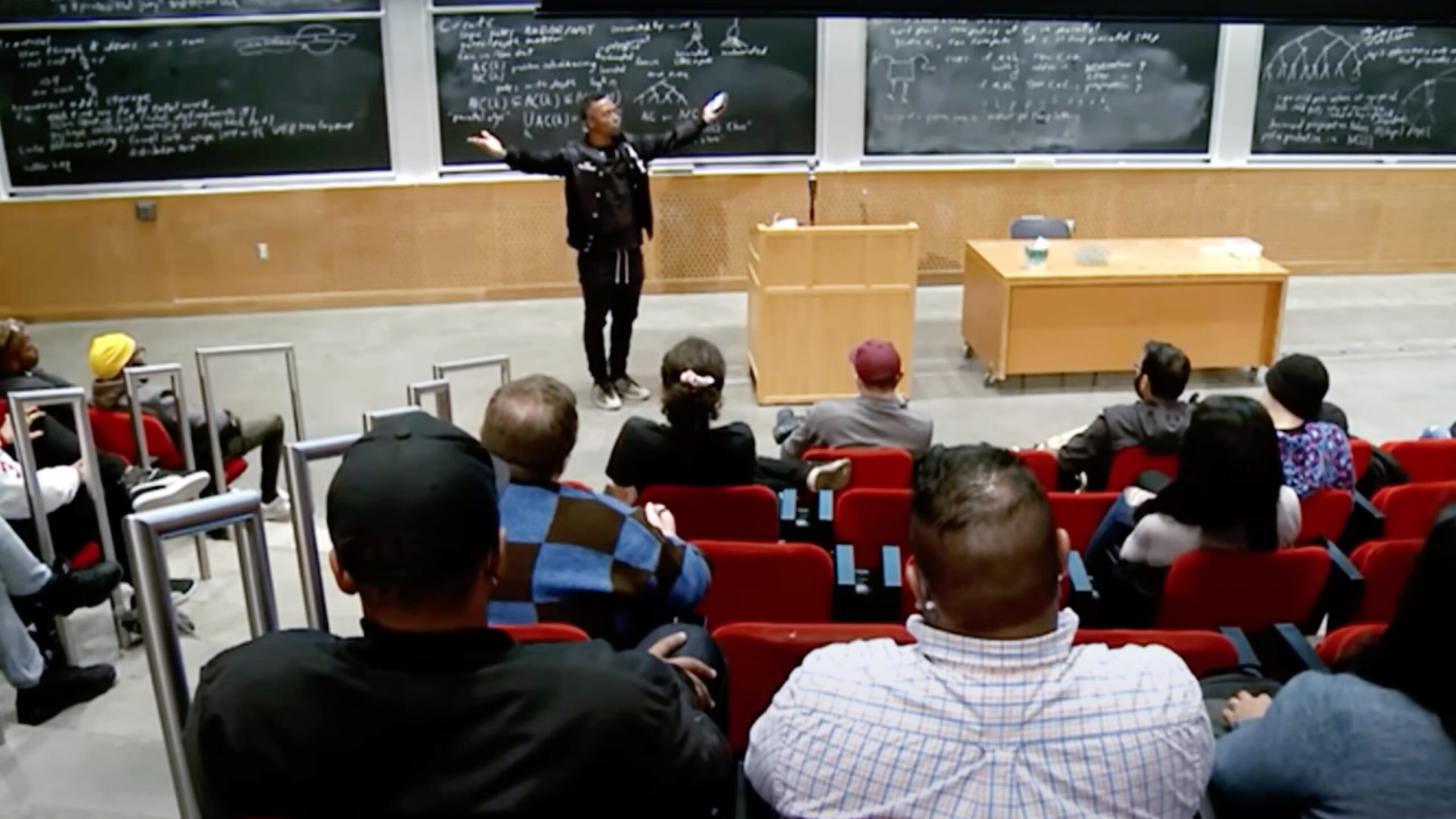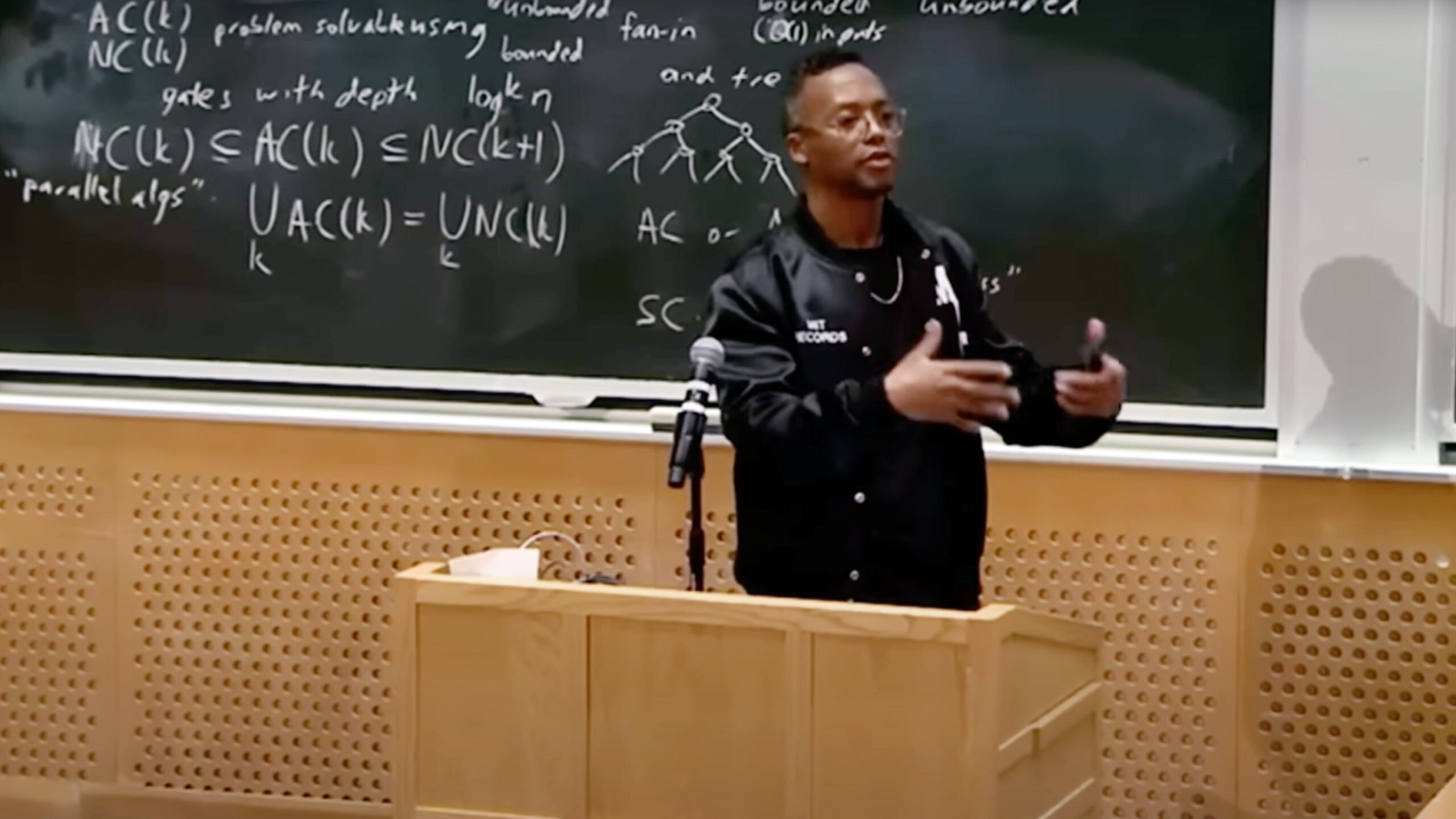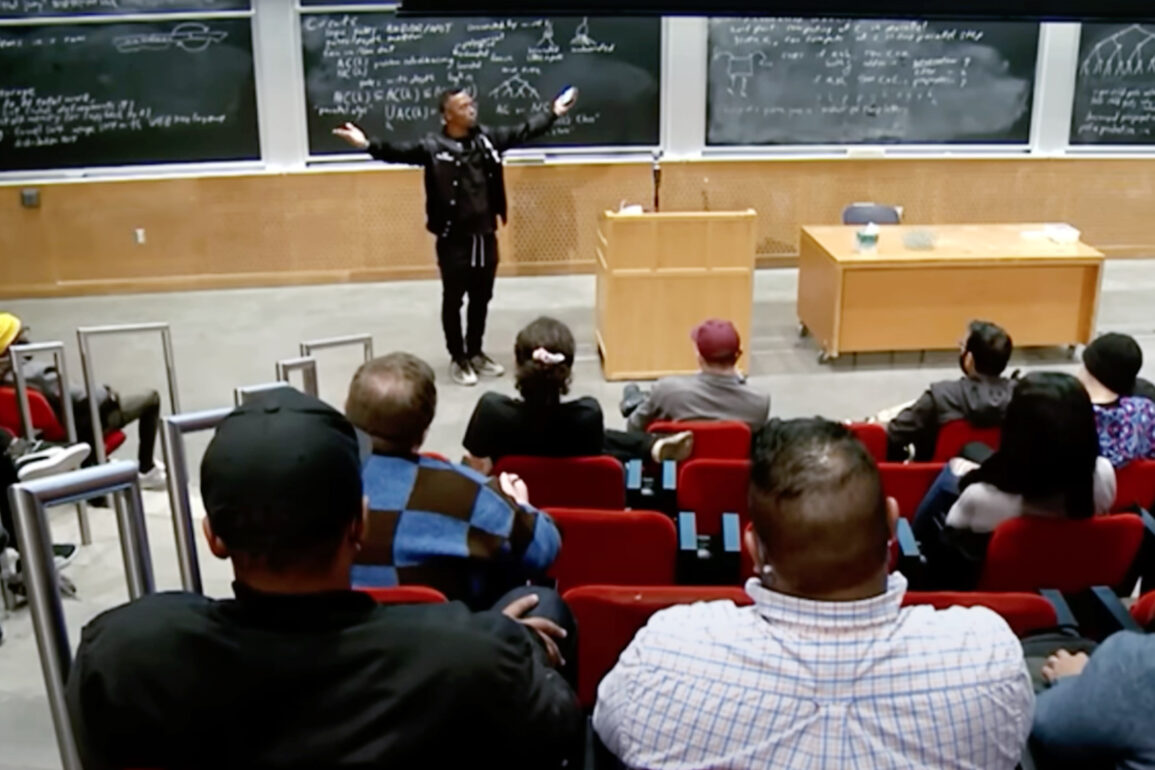Lupe Fiasco is a multiplatinum rap legend who typically performs at packed clubs and concert halls across the US and around the world. But in the spring of 2023, he made twice-weekly appearances in a decidedly different venue: an MIT classroom.
On an April afternoon in 4-257, Lupe greeted the students in his class, CMS.S60: Rap Theory and Practice, and chatted with them about the differences between the martial arts practices of Wushu and its Islamic counterpart before deftly transitioning into the day’s lecture. He then walked them through the components of their final project: composing and producing an extended play (EP) recording of their own original music, an assignment meant to challenge their abilities and apply the tools and ideas covered in the course.
The rapper had begun the semester by taking the class through rap’s inception in the 1970s and the technologies available at the time before digging into the rhymes, song structures, and production techniques popularized in the ’80s. After covering the evolution of rap in the decades that followed, Lupe taught theory and practice simultaneously, coaching students to expand their rap songwriting abilities through literary devices, cognitive theoretical concepts, and tips and tricks to develop creative discipline. Along the way, he packed nuggets of wisdom into acronyms (like the encouraging WACK: “with adjustment, could kill”) and catchphrases (such as “Creativity is not magical.”)
While it might seem surprising that a Grammy-winning rap artist taught a class at MIT, for Lupe it was a logical next step in his ongoing effort to formalize rap training and scholarship.
Lupe—who at MIT goes by his given name, Wasalu Jaco, or sometimes Professor Lupe—has spent two academic years at the Institute, arriving for the first (a stint as a visiting artist with the Center for Art, Science, and Technology) in the fall of 2020. By that point, he had been seeking out materials and knowledge to build a framework for rap pedagogy for several years. It was an academic quest that had also led him to the University of Pennsylvania, Caltech, and the Hiphop Archive & Research Institute at Harvard’s Hutchins Center for African and African American Research.
But Jaco felt most at home at MIT, where in the fall of 2021 he and Nick Montfort, a professor of digital media who is also a computational poet and rapper known as Doc IT, co-led Code Cypher, a one-day creative coding competition centered on language and rhythm. So when Montfort and literature professor Mary Fuller nominated Jaco as a 2022-’23 MLK Visiting Scholar, he was eager to return. He spent the year not only teaching a class, but also doing research and working with Montfort in his Trope Tank lab on a project to develop a computer rapper that improvises in response to other rappers, whether human or computer. (So far, they’ve made a lot of progress on the “ear”—the part of the system that can evaluate the text of a rap and pick out the best and worst parts.) Jaco also found time for things like serving as the judge at Trackathon, an MIT hacking marathon centered on producing music tracks.
“Rappers, we learned things on the fly … But it’s still a process that has steps and formulas that can be isolated and examined and analyzed and then reproduced.”
Wasalu Jaco (a.k.a. Lupe Fiasco)
“I really wanted to be at MIT,” Jaco says. “I’m a nerd at heart. MIT is the cutting edge of things from research to robotics. So it’s always had a place in my mind, and the opportunity to go there in this capacity and then use that as a springboard to at least peek into different spaces and different labs is something that I just couldn’t pass up.”
For the past seven years, Jaco, who is also a music producer and an entrepreneur, has been working to develop a theoretical approach to the art of rapping through the Society of Spoken Art (SOSA), an educational guild for rappers that he cofounded in 2015. “Rappers, we learned things on the fly,” he explains. “There was no formal education to become a rapper. But it’s still a process that has steps and formulas that can be isolated and examined and analyzed and then reproduced.”
To create rap pedagogy, Jaco has pulled from fields as disparate as astronomy and biology. He and SOSA member Nikki Jean used Montfort’s textbook on exploratory programming for the humanities to incorporate computing into a curriculum they developed for the group. (Montfort has led in-person and online workshops for SOSA and joined SOSA himself as an apprentice, hoping to extend his own abilities as a rapper and experimental poet.)
Jaco has also been delving into the hallmarks of rap—such as the element of surprise in punchlines, or the practice of dense storytelling that packs volumes of meaning into few words—to analyze what makes them effective. To do that, he’s looking at rap lyrics as literature, studying their embedded signs and symbols, and examining rap from a linguistic standpoint to determine, as he puts it, “what is happening distinctly in rap as opposed to normal speech or classical poetic traditions.” He has even been considering the neuroscientific aspects of how rappers conceive, compose, and perform their work.
During his most recent year on campus, Jaco did a deep dive on the phenomenon of surprise. “That’s a fundamental aspect of rap and of punchlines and the aha moment—the revelation,” he says. “How deep does that rabbit hole go cognitively? What’s the neuroscience look like? Are there computational models that model surprise? And then you can kind of map that across metaphor theory or alliteration; is there something specifically that has a cognitive back end? If you explore it, you’re able to isolate certain practices or techniques to emphasize or modulate that process to get to a higher quality of it.”
Jaco also ventured beyond the classroom to work with the public; in May, he led two rap workshops at the South Bay House of Correction with participants from both sides of the prison walls, including young inmates in a unit designed to foster respect and keep them from returning to jail. He guided prisoners, local rappers, and MIT professors and undergraduates in exercises that demonstrated the power of language and pushed them to write and perform their own verses on simple subjects.
For his CMS.S60 class, Jaco started his students off with assignments meant to get them comfortable with creating music, writing rhymes, and sharing them out loud. Then they moved on to composing and recording verses and song hooks, and Jaco encouraged them to use one of several techniques to build out 16-bar verses working through each concept they’d covered. This work culminated in the final project, an eight-minute-long EP with five tracks synthesizing core concepts in the class, from autobiography to computation and even social consciousness. Students were very tech conscious and tech forward; Grandmaster Flash, the pioneer of many turntable techniques that laid the groundwork for hip-hop DJing and sample-based production, would be proud.
Jaco also incorporated exploration and experimentation into his class, tapping into the scientific method. “What happens when you apply the formal practices and processes of, say, biochemistry or mechanical engineering or architecture to rap?” he asks. “What matches, what breaks down, what work is already done for you? What new things do you need to add to the pot?
“And what happens when you really look at rap as a real, valid poetic exercise?” he continues. “You apply all the methodologies of a traditional poetic program to it, and what matches, what doesn’t?” What’s unique to rap represents territory where there’s still plenty of room to explore.
The music industry itself was also on the syllabus. “Every creative act has an industrial response. Every industrial act has a creative response,” he says. “What is your place in that process? And industry gets redefined, you know? And so it’s like the pencil industry, or the turntable industry or the financial industry—or how did this particular legal thing that involved music publishing affect the structure of songs?”
In other subject areas at MIT, that interplay is a given. “If you’re in the main entrance [in Lobby 7] and you look up, it says the arts and science and technology, right?” Jaco observes. “MIT’s goal is to weave all these things together and [study] how they influence and talk to each other and respond back to each other.”


Wasalu Jaco, a.k.a. Lupe Fiasco, gave a lecture called “Rap Theory & Practice: an Introduction” in the Stata Center last December—and it quickly racked up over a million views when MIT Comparative Media Studies/Writing posted it online.
Back in class, TA and aspiring pop musician Ajay Arora ’23 dove into a mini tutorial on how students can use AI programs like ChatGPT to jump-start their creative processes. Jaco then turned the conversation to the realm of computational hip-hop, from raps made for computers (with audio tracks that only a computer could interpret and unscramble) to poetry and songs written via code.
Moises Trejo ’22, who performs as DJ Trejo Conejo and audited the course, says Jaco’s insights on storytelling approaches will stick with him. (For example, Jaco told the students that some lyrics “decorate the mundane,” or explore the nitty-gritty of life in detail, while others are “didactic” and teach listeners how to do or be something.) Trejo recently recorded a song using the idea of school lunch and Bronx rapper Ice Spice’s “Munch (Feelin U)” to explore Maslow’s hierarchy of needs—another lesson from Jaco. He says he’s gained a new respect for rapping as an art form and hopes to continue rapping, making music, and even writing poetry part time as he pursues a career as a software engineer.
Ally Minju, a Christian rapper and producer from Los Angeles whose musical experience began with classical piano training, started recording her own music as an MIT student in the Class of ’22 before taking a leave of absence to pursue music full time; she came back last fall, just as Jaco arrived as a visiting scholar. Minju says Jaco’s class has helped expand the range of music she feels comfortable making. At a time when she had been in something of a rut, she says, the course pushed her to stay active as an artist and wordsmith.
Looking beyond the class at MIT, Jaco envisions a network of artists developing rap studies in many places; he contends that degrees in rap and hip-hop should be offered not only at schools specializing in music or the humanities but at technical and scientific institutions as well. He was drawn to the ivory tower because “it’s about constantly pushing the frontiers of your craft,” he says. “We’ve conquered so many spaces, from business to entertainment to culture, right? What are the spaces that we have yet to get into? What other frontiers are left? For me it was always academia.”
For Jaco, there’s no question that rap fits right in. “Once you get rappers in that classroom, the way that they’re able to communicate, the way that they’re able to facilitate community and conversation and then carry that conversation and drive it into deeper spaces and challenge people—it’s on par with the top professors of any subject.
“I was fortunate enough to have MIT willing to bring me in and roll the dice with your boy,” he says. “And I think we really kind of pulled it off and showed, like, yeah—this works. It’s about setting the standard at the highest, so it’s no coincidence that I’m at MIT. I wanted to get challenged and get beat up and lose, but also win, show the fight.
“If you can do it here, you can do it anywhere, you know?”
This post was originally published on this site be sure to check out more of their content.







